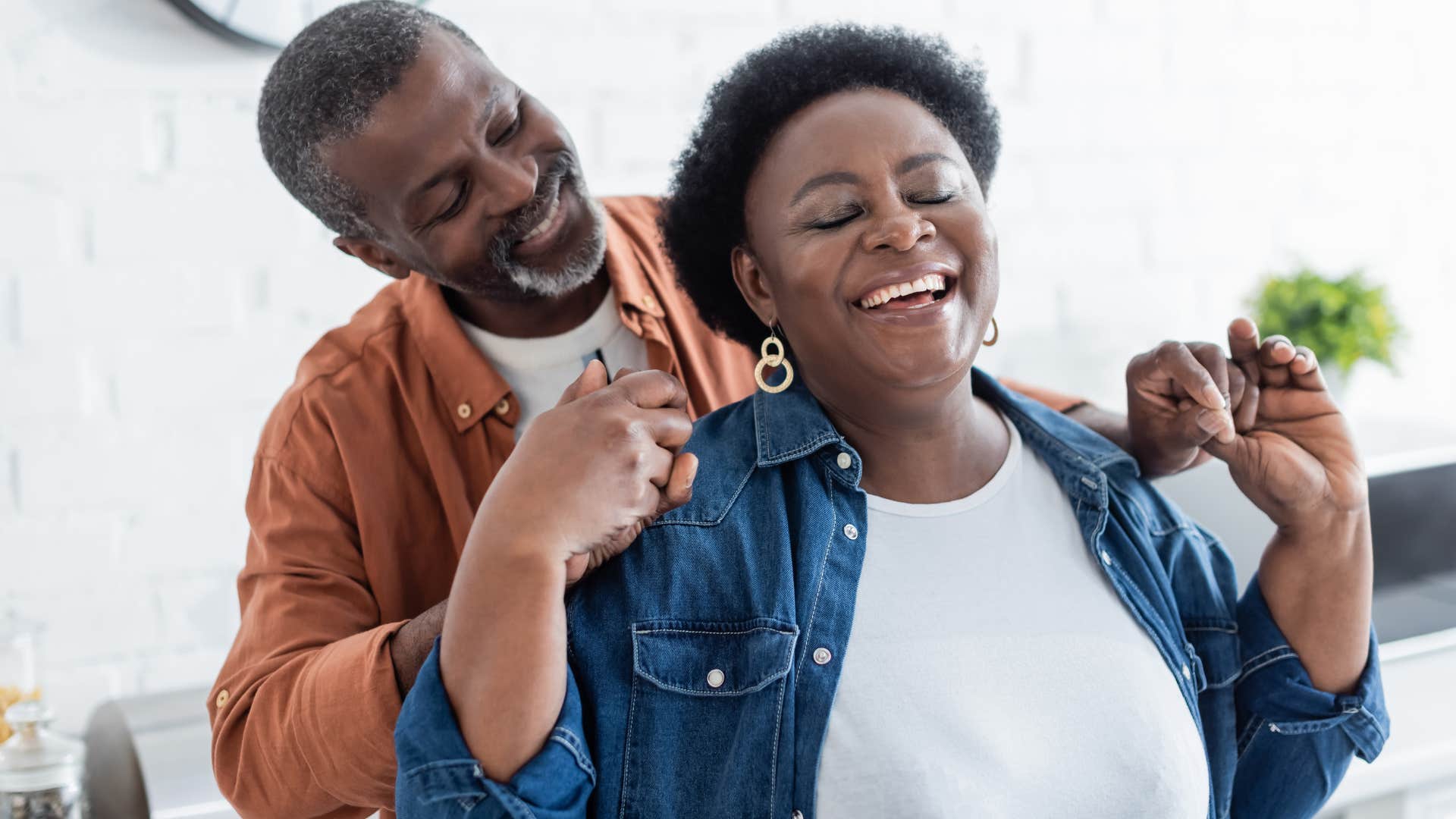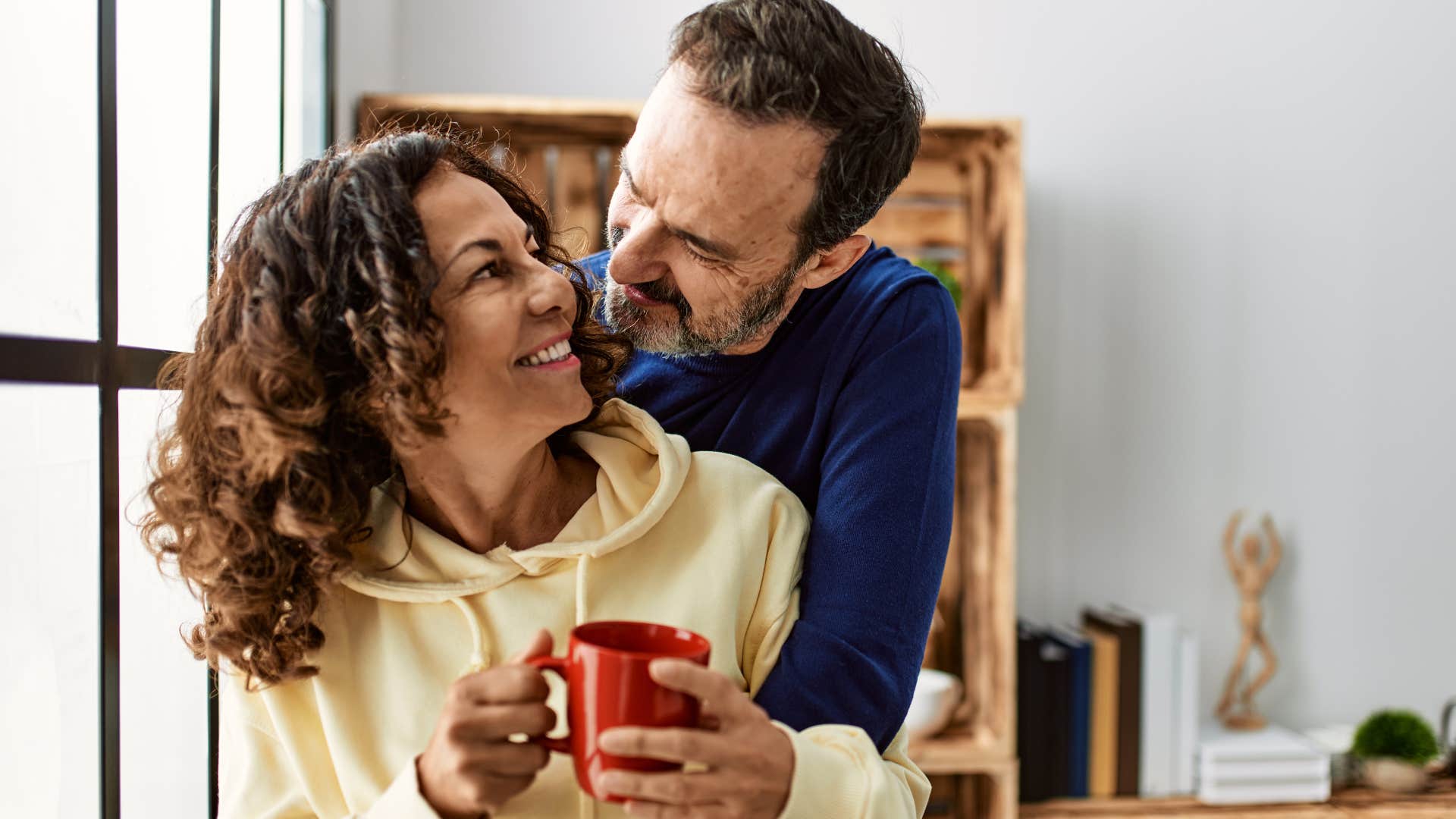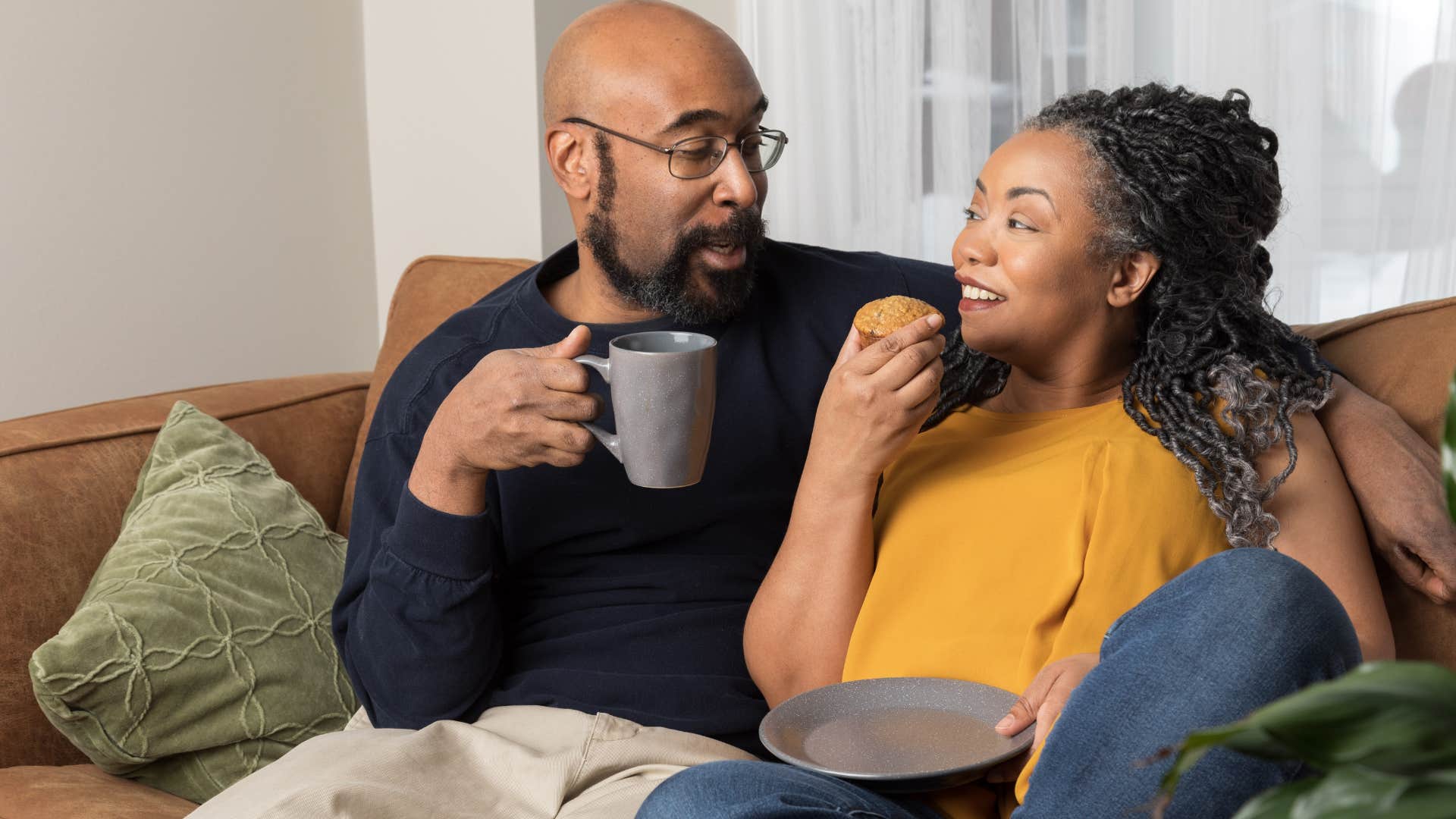Wives Who Feel Deeply Loved Into Their 60s Usually Hear These 11 Things From Their Husbands
Wives who still feel deeply loved into their 60s have developed strong and comforting communication habits with their husbands.
 HannaMonika / Shutterstock
HannaMonika / Shutterstock Obviously, couples who boast higher satisfaction in their relationships tend to stay together for longer, but what plays into each partner’s happiness, comfort, and commitment in these connections? According to a study published in the Psychological Reports journal, marital satisfaction is most notably characterized by a number of behaviors and traits, from communication patterns to flexibility, motivation, and financial status.
Specifically, when it comes to communication habits, wives who feel deeply loved into their 60s usually hear things from their husbands that make them feel secure, respected, and understood. Having a partner who supports their individuality, time, and comfort is key to maintaining a long-term relationship throughout all stages of life.
Wives who feel deeply loved into their 60s usually hear these 11 things from their husbands
1. ‘I love you’
 Lomb | Shutterstock.com
Lomb | Shutterstock.com
According to Harvard psychologist Dr. Cortney Warren, saying “I love you” regularly is a simple way to express your love to a partner or offer them affection amid the chaos of everyday life. When a husband regularly says this to his wife, and more importantly, means it, he’s not only bonding the two of them together, he’s keeping their romantic love and spark alive.
Women who feel deeply loved into their 60s by their husbands hear phrases like “I love you” often, whether it’s following a heated argument or within the mundanity of their morning routines.
2. ‘I’m here for you’
 stockfour | Shutterstock.com
stockfour | Shutterstock.com
Being present in a relationship, thoughtful with your words, and intentional about communication in a marriage can bolster satisfaction and health, whether you’re already in a good place with your partner or not, as a study published in the Qualitative Research in Medicine & Healthcare Journal explains. Phrases like “I’m listening” or “I’m here for you” are simply manifestations of that effort from partners that care enough to put in the time and energy to uplift, empower, and support their spouse.
Wives who feel deeply loved into their 60s usually hear these things from their husbands. Whether it’s dilemmas with aging, societal norms, interpersonal relationships, work, or otherwise that they’re struggling with in this stage in their lives, they always have someone to lean on for advice, support, and encouragement when things get tough.
3. ‘I respect your decision’
 insta_photos | Shutterstock.com
insta_photos | Shutterstock.com
Even in arguments where couples don’t agree or have highly emotional conversations about their needs, partners who show up and emotionally support each other generally have better communication than others. Even if they don’t share the same opinions or outlooks on certain things, they’re still working from the same time, respecting and making space for each other’s voices.
That’s why wives who feel deeply loved later in life by their husbands are used to hearing phrases like “I respect your decision” or “I hear you.” They don’t have to beg for open communication, respect, or empathy, no matter what the topic of conversation is, and their relationship is better off because of it.
4. ‘I’m sorry’
 CarlosBarquero | Shutterstock.com
CarlosBarquero | Shutterstock.com
According to a study published in the Journal of Family Psychology, couples who regularly practice apologizing and forgiveness are more likely to have longer and more satisfying relationships than those who don’t. A wife who feels deeply loved into her 60s doesn’t have to beg to feel heard, seek out apologies, or even grapple with the consequences of a partner who constantly takes a victim mentality in arguments. She’s supported, forgiven, and apologized to frequently.
Even if her husband doesn’t agree with the claims she’s making or feels like he’s done nothing wrong, he’s willing to put his own ego on the back burner to apologize. Even for something as simple as hurting her feelings with a passing comment, he’s willing to apologize and emotionally support when he can.
5. ‘You look beautiful’
 Monkey Business Images | Shutterstock.com
Monkey Business Images | Shutterstock.com
According to a study published in the Journal of Personality and Social Psychology, partner attractiveness is more important for indicating relationship satisfaction in men than it is for women. Especially with age and over the course of a long-term relationship, feeling attracted to a partner can mean a lot for intimacy and connectedness for husbands.
That’s why subtle comments like “you look beautiful” and intentional compliments truly reassure wives over the course of a relationship. Not only do they feel seen and intimate with their partners, they’re reassured of the shared attraction between the two of them, which is not everything, but still plays an important role in a marriage.
6. ‘I’m proud of you’
 Inside Creative House | Shutterstock.com
Inside Creative House | Shutterstock.com
When partners are celebrated for achieving their goals and empowered at home to dream big, their overall life satisfaction improves, and alongside it, their happiness and satisfaction within their relationships. Even hearing seemingly simple phrases like “I’m proud of you” or “You’ve got this” from a partner on a regular basis can be the recognition and support that people need to truly lean into the discomfort of change and challenge.
Wives who feel deeply loved into their 60s usually hear these things from their husbands. Even as they get older and tackle new challenges, they feel empowered to continue chasing new goals and crafting a life that’s fulfilling and meaningful.
7. ‘I’m so grateful for you’
 Lightfield Studios | Shutterstock.com
Lightfield Studios | Shutterstock.com
Expressing gratitude and giving thanks, whether it’s to other people or simply for the things already in your life, are profound practices that amplify feelings of connectedness, happiness, and life satisfaction, according to experts from Harvard Health. Even if it’s a partner saying “I’m so grateful for you” amid the mundanity of everyday lives and routines, it makes all the difference in ensuring their spouse feels appreciated, heard, and respected.
Another study published in The Journal of Positive Psychology found that when partners truly mean the gratitude they’re expressing and are intentional with these thankful practices in their daily lives, they not only grow closer with their spouses, they also boast better personal wellbeing and self-esteem.
8. ‘I love our life’
 Evgeny Atamanenko | Shutterstock.com
Evgeny Atamanenko | Shutterstock.com
Even when there’s work to be done in a couple and personal room to grow in a relationship, there’s always space for reflection, gratitude, and appreciation. Even if it’s a phrase as simple as “I love our life together” or “I appreciate you,” it can mean a lot to ensure partners feel deeply loved in their relationships.
As psychology professor Gary W. Lewandowski explains, longevity alone isn’t a sole indicator of relationship health for partners that have been together for a long time, but instead the habits, behaviors, and intentionality they prioritize.
If they have life experience or a decade worth of anniversaries under their belt, that doesn’t necessarily mean marital partners are committed or happy, but if they’re open about reflecting on it intentionally, having honest conversations, and expressing gratitude, those could be signs of health.
9. ‘What can I do better?’
 Krakenimages.com | Shutterstock.com
Krakenimages.com | Shutterstock.com
Research suggests that partners who have a growth mindset tend to boast greater relationship satisfaction and happiness than those who don’t. Whether it’s expressing their concerns with a partner, prioritizing their own personal development, or simply planning for the future, people who focus on growth and make space for development are happier, healthier, and more connected.
“What can I do better?” or “How can we handle this as a team?” are perfect examples of a husband with a growth mindset. He’s not only worried about personal growth, but building something stable and healthy with his partner that puts them both ahead.
10. ‘I miss you’
 Dragana Gordic | Shutterstock.com
Dragana Gordic | Shutterstock.com
Even though many partners in long-term relationships tend to develop their own big and separate things from marriage with age, like career success, friendships, and even personal passions, the things that bring them back together can be subtle.
Even little phrases like “I miss you” are powerful between long-term partners, reminding them that, regardless of the chaos of everyday life and other responsibilities, their presence is still seen and valued.
11. ‘How are you feeling?’
 Angela Holmyard | Shutterstock.com
Angela Holmyard | Shutterstock.com
Amid the chaos of everyday life, it’s important for partners to check in with each other, even if it’s just 5 minutes at the end of the day to ask how they’re feeling. As marriage experts Linda and Charlie Bloom argue, it’s easy to fall into routines of stagnancy and disconnection. Still, with intentional communication and emotional connection, even the longest relationships can thrive.
Wives who feel deeply loved into their 60s usually hear these things from their husbands. They’re not only asked things like “How are you feeling?” and “What can I help you with?” — they're also offered space and support for expressing what they need.
Zayda Slabbekoorn is a staff writer with a bachelor’s degree in social relations & policy and gender studies who focuses on psychology, relationships, self-help, and human interest stories.

